Ethan Lou is opinion editor of The Globe and Mail’s Report on Business.
In late November, the billionaire Terry Gou, founder of Foxconn, the electronics manufacturing behemoth that puts together your iPhones, took to the stage in a Taiwan hotel to deliver a speech that was at once Trumpian and Shakespearean.
So rambling was his soliloquy, it’s hard to quote from it concisely and still make sense. Here, have a listen: “God had closed a door on me but opened a window, giving me a blissful second marriage.”
But the gist of it was that Mr. Gou – who had declared his candidacy for Taiwan’s Jan. 13 presidential election – wanted everyone to know that, despite polling dead last, he had brought his rivals together that day and was thus a very important person.
Implicit in Mr. Gou’s speech was that he knew he had no chance at the presidency. But he said he had gathered his peers from Taiwan’s two leading opposition factions so that all of them, who are seen as friendlier to mainland China than the incumbent party, could run a victorious united ticket.
Amid recent geopolitical turmoil around the world, never has Taiwan’s fate hung more precariously. All of those gathered by Mr. Gou have said some version of this: For the sake of its survival, the island should temper its ambition and not provoke Beijing, which claims it as part of its territory.
But despite the sunny spirit of conciliation that had sparked the press conference, theirs was a side that had always seemed a few apples short of a fruitcake.
Passive-aggressive barbs were thrown regarding who was kept waiting and who had shown up uninvited. One candidate read out private text messages from another that disparaged Mr. Gou. Party leaders bickered until one group simply got up and left.
All the while, sitting centre stage, silently, awkwardly and inexplicably, was the handsome figure of Ma Ying-jeou, a former president of Taiwan, known for his good looks, no longer active in politics but still internationally respected. When pressed by Mr. Gou to speak, Mr. Ma said he was a mere observer and declined, presumably out of sheer embarrassment.
No united front was formed that day. In the aftermath of the two-hour cringe-saga, broadcast live to the world, a spokesperson for Mr. Ma’s party said its leaders had been “greatly humiliated in public.” Mr. Gou dropped out of the race, although his remarks lived on in internet memes.
Foxconn founder Terry Gou, second from left, speaks at a Nov. 23 news conference with opposition presidential candidates Ko Wen-je, far left, and Hou Yu-ih, second from right. Also present are ex-president Ma Ying-jeou, middle, and Kuomintang chairman Eric Chu, far right.Carlos Garcia Rawlins/Reuters
Yet for all that sorry slapstick, what’s most interesting about that day wasn’t so much the black comedy on display. It’s the laughable futility of those men’s efforts.
Over the years, the side of Taiwan’s political scene friendlier to Beijing has weakened and crumbled, while Beijing has hardened its stand against the island. Try as these poor politicos might to unite that November day, they no doubt remembered how their faction had similarly fractured ahead of the 2000 election, to disastrous effect. It even happened at the same hotel. It’s as if those men’s efforts have come up against some unknown, unconquerable force.
Such is the lens through which to view the coming election. Analysts have said a lot about the Jan. 13 polls, about how pivotal they are for the island, how Taiwan’s fate hinges on the outcomes. But perhaps the characters on that stage have never been the prime movers who shape the island’s path.
Economists talk about the invisible hand, a force that pushes the market toward its natural state regardless of any specific individual decision. In geopolitics there is a counterpart: the march of history. For Taiwan, this force is strong: a century-old story, war upon war, nothing ever resolved. As the years passed, Team America increasingly lost its will to play world police, the traditional global order started unravelling, problems within and without distracted the West, and the gulf between Taipei and Beijing widened.
And so, two weeks ahead of Taiwan’s election, Chinese President Xi Jinping made some of his strongest-yet comments about the island: “The reunification of the motherland is a historical inevitability.” Mr. Xi was not just expressing his own desire, but channelling the will of a greater force.
A clash with Beijing is simply unavoidable. There’s a Chinese saying: The plots of men and women can never rival the plots of fate and destiny.
Supporters of the opposition Kuomintang party wave Taiwanese flags and pictures of candidate Hou Yu-ih at a Jan. 4 rally in Keelung. The Kuomintang, or Nationalists, were once the ruling party of mainland China, but when leader Chiang Kai-shek lost a civil war to the Communists, his followers regrouped on this island.Ann Wang/Reuters
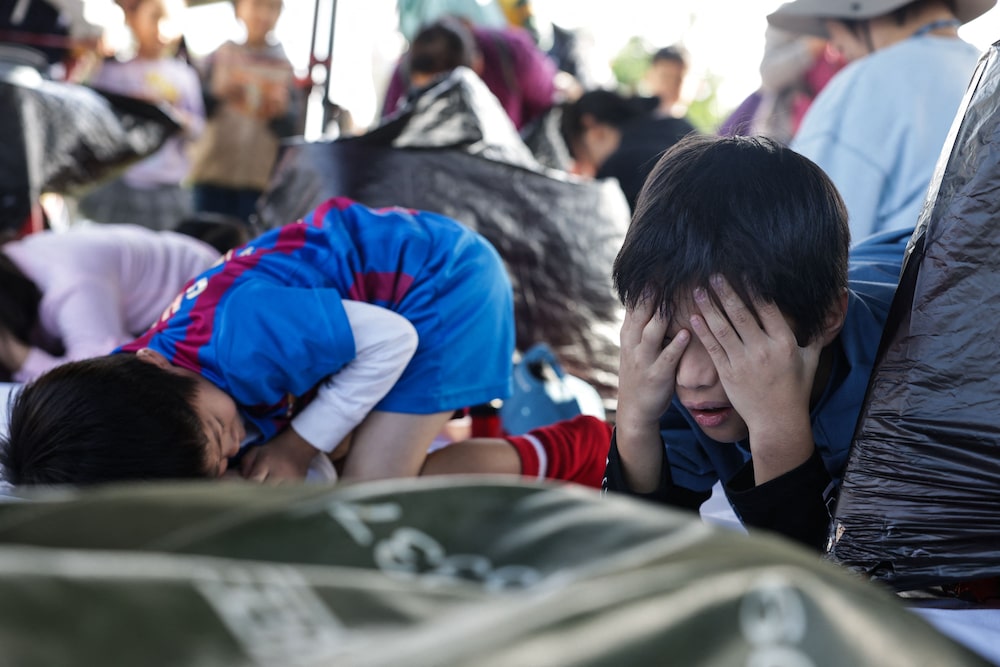
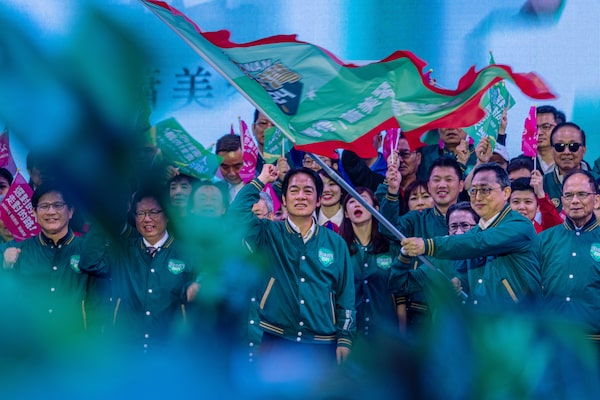
Presidential candidate William Lai, also known as Lai Ching-te, cheers to supporters of his Democratic Progressive Party at the Dec. 3 opening of their Taipei campaign headquarters. Mr. Lai served as vice-president under current Taiwanese leader Tsai Ing-wen.Annabelle Chih/Getty Images
To be clear, while there might certainly be elements of warfare in what is to come for Taiwan, it might not be “war” as we traditionally understand the term. A straight-up invasion isn’t exactly fun, as Russia’s recent experience in Ukraine has demonstrated. Moreover, Beijing doesn’t need to do that.
Despite comparisons by many observers, Taiwan isn’t Ukraine. The latter is a sovereign state in an absolutely clear-cut way, and so, no doubt, Russia had deemed the only way to take it was to storm it with the subtlety of a hippopotamus. Beijing has more options. Despite Taiwan’s de facto independence – it’s not being a part of Communist China – it’s still officially part of a China by a different definition, a deliberately muddled state of existence. It’s in this mass of vagaries that Beijing thrives.
The closer analogy to Taiwan is Hong Kong. A great authoritarian transformation has descended upon the territory, but Beijing has gotten there by turning up the heat only bit by bit. When every once in a while Beijing cracked down on protesters too hard or purged someone too prominent, the West seemed to treat each instance as a separate event, and so simply reacted in what it thought was a proportional way. The West griped and moaned and sometimes even sanctioned a few folks, and that was all. Now, zooming out, we can see: China has successfully boiled the frog.
From the beginning, of course, Hong Kong has been under Beijing’s thumb more than Taiwan, both in law and in practice. So, it will not be the exact same playbook that Beijing brings to Taiwan. In all likelihood, it will be a mixture, between the brusque shock-troop assault of the Russians and China’s trademark weaponized economics, guile, patience and an uncanny ability to shake with its right hand while holding a rock in its left.
This is the ultimate tragedy of Taiwan. The world might not readily know what to call such a move on the island when it happens. The world might not even recognize it immediately. But it is coming. For all we know, with Beijing’s disinformation campaigns and menacing war games across the waters, it has already begun. When matters come to a head, the world will recognize it for the inevitable clash that it is. For such is what the march of history has ordained.
Taiwan’s existence today is born of an unfinished fight, when the nationalist Kuomintang, China’s ruling party of the day, fought the Communists in a civil war and, in 1949, fled and set up government on the island. And as Alexandre Dumas writes in The Count of Monte Cristo, “Nothing attracts a serious duel like an inconclusive one.”
At his room in a Taiwanese nursing home, 93-year-old Wang Chih-chuan – one the last surviving generation to fight in the original Sino-Taiwanese conflict – keeps photos from his years in the Chinese army. He was a Korean prisoner of war who ended up in Taiwan and got ‘press-ganged’ into the military at 13. ‘To this day I don’t want to watch war on the television. War is cruel, callous.’Ann Wang/Reuters
In The Decline of the West, Oswald Spengler, the German philosopher, writes about the painful insignificance of Napoleon Bonaparte, the conquering French emperor. There is a quality that was “tragic in Napoleon’s life,” Mr. Spengler writes. “It was not Napoleon who originated the expansion principle” – that ceaseless hunger of the European powers that had infused its culture and defined its leaders. “It was not Napoleon that formed the idea, but the idea that formed Napoleon, and then when he came to power he was obligated to pursue it.”
Such an interpretation is not meant to absolve all the tyrants of the ages. In fact, it’s a view that is above any such absolution; its premise is that men like these are not the causes of events but the symptoms, that individuals ultimately do not matter to history. And it doesn’t just apply to the history of the centuries-old sort.
In Saudi Arabia, research shows most men actually support equal rights for women, but they all think their countrymen are less enlightened. That’s why women are still required to have male guardians for their legal decisions. A Globe and Mail colleague has written that a majority of lawyers favour innovation and evolution for their industry – but they also think law as a whole is too stubborn and ossified for that to ever happen. That’s why lawyers still carry to court trolleys of dead trees.
Sometimes, events play out a certain way not so much because of what individual people do or think, but because the system and culture – the history – has its own weight and its own will. The issue of Taiwan is no different.
Over the years, as the civil war grew distant in memory, Taipei’s KMT and Beijing’s Communists had come to a begrudging normalization of ties, based on a mysterious and cryptic agreement to disagree. But this idea of a harmonic co-existence goes against a universe that does not want it to be so. All throughout the decades, if you know where to look, you can see the cracks in its foundation.
The issue on Taiwan’s side is the breakdown of the faction seen as friendlier to mainland China. The KMT, ironically Beijing’s best friend on the island after postwar reconciliation, had started its rule in Taiwan under martial law. The KMT did not truly see the light of democracy until the 1990s, and under the new system it has been struggling. Then there was Beijing’s 2014 crackdown on Hong Kong protesters. Across Taiwan, a realization: This is what happens when you get too close to the mainland.
Ms. Tsai has passed the DPP mantle to Mr. Lai after her two terms in office.Carlos Garcia Rawlins/Reuters
This is how the incumbent president, the Beijing-wary Democratic Progressive Party’s Tsai Ing-wen, rose to two terms in power. If the DPP wins again through Ms. Tsai’s successor, Vice-President Lai Ching-te, also known as William Lai, it would be a feat no party from the island has ever accomplished. It would send the clearest signal yet to China’s Communists: This is Taiwan’s direction, and there’s no going back.
Yet there will be no better days in the event of a win by any of the Beijing-friendlier folks gathered by Mr. Gou at that disastrous press conference: the KMT’s Hou Yu-ih, or the third-party candidate, Ko Wen-je of the Taiwan People’s Party.
Just as Taiwan is no longer defined by the KMT, China’s Communists are no longer the same as those during the golden age of bilateral ties.
The Communists under Mr. Xi are not the ones who unprecedentedly opened China’s doors to Richard Nixon in the 1970s and Kentucky Fried Chicken in the 80s; the ones who valued their word given to the British that Hong Kong’s freedoms would remain unchanged until 2047; nor the ones who once resolved the Hainan Island diplomatic crisis with Bill Clinton’s United States so measuredly that internally they were accused of weakness.
This is China’s new face: The Wolf Warrior diplomacy, named after two action movies about Beijing’s international supremacy, barely a notch above propaganda. The increasing projection of influence through aggressive territory claims and Belt and Road debt traps. The rising jackboots and surveillance state, falling upon everyone from Uyghurs in Xinjiang and lawmakers in Hong Kong to dissidents abroad and two Canadians out of luck.
The Beijing of today is not a Beijing that will consider maintaining the status quo with a resurgent KMT through some new gentlemen’s agreement. Now, aside from during the civil war, and Beijing and Taipei have never been farther apart.
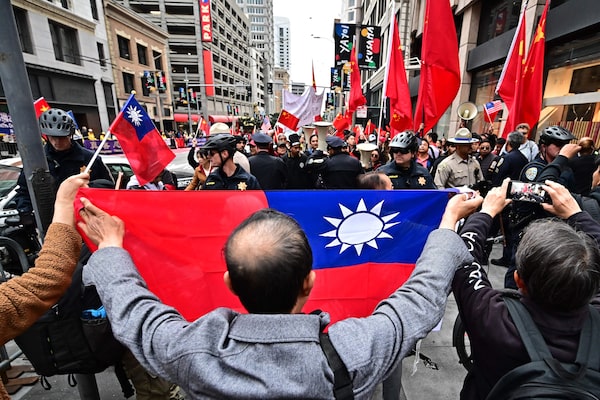
Pro-Taiwan and pro-Beijing demonstrators wave flags at one another across a line of police in San Francisco on Nov. 15, when Chinese President Xi Jinping was in town for the APEC summit.FREDERIC J. BROWN/AFP via Getty Images
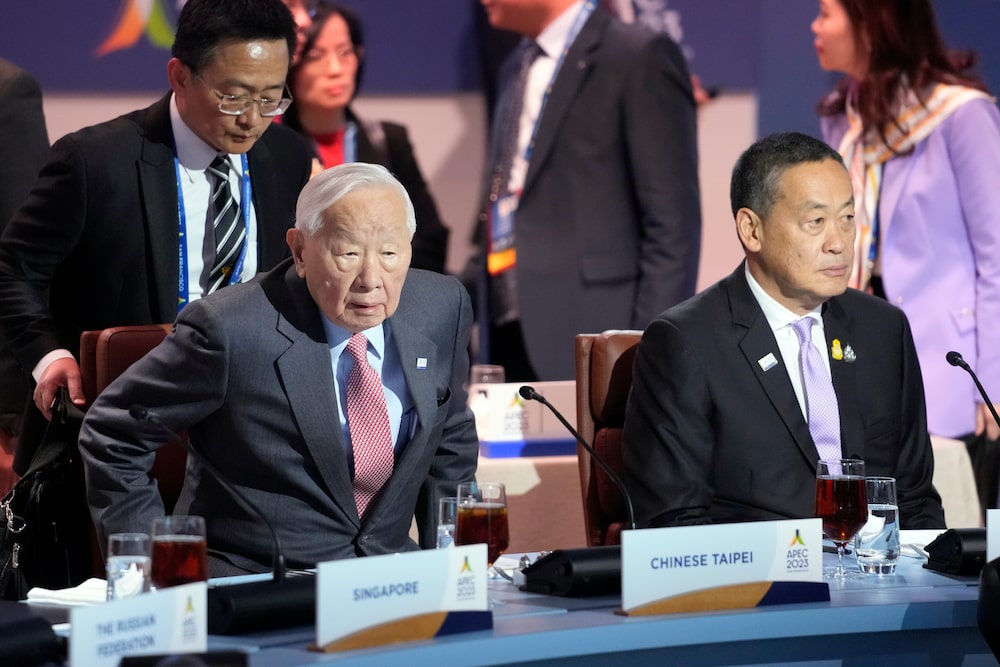
Then there’s the state of the rest of the world.
There once was optimism, when the Soviet Union fell with the Berlin Wall, and the scholar Francis Fukuyama wrote the disastrously aging The End of History and the Last Man. In it Mr. Fukuyama writes that the endless cycles and conflicts of the ages were done: We were all going to embrace the rules-based international order that sprang from the Second World War.
For a while, it did look that way. But this world order had been upheld by a force that was increasingly spent.
In the past 20 years the U.S., despite waging a few wars, has largely shrunk in its world police role, and by the time it got to president Barack Obama, this shrinkage had crossed a threshold. Mr. Obama issued an ultimatum in 2012: If the Russian-backed Assad regime were to use chemical weapons in the Syrian civil war, then American forces would intervene. President Bashar al-Assad did exactly that, and Mr. Obama didn’t follow through.
It wasn’t Mr. Obama’s fault. It wasn’t he who had brought U.S. power to its twilight. He was simply the man of the day. Yet all the same, the impact of that loss of American credibility was stark.
David Greenberg, a U.S. historian, draws a direct link to Russia’s annexation of Crimea in 2014 and its electoral interference in the 2016 U.S presidential election. That one instance of perceived U.S. weakness in Syria, Mr. Greenberg writes, “may well have encouraged America’s adversaries, including Russia, to test Obama further.” Such tests of Mr. Obama no doubt included China’s early moves on Hong Kong.
And just as American influence was being chipped away, Mr. Obama was followed by president Donald Trump and Brexit. By the time President Joe Biden came tottering around, he was but a blip against vast currents already coursing with momentum: The Taliban took back Afghanistan, Russia moved further against Ukraine, and Hamas struck upon Israel. In 2023, the world recorded the most deaths from armed conflicts since 1994, when the Rwandan genocide happened.
In that context, Beijing’s confrontational global posture of late, the Wolf Warrior diplomacy, its increasing harshness and land-lust for Taiwan, makes perfect sense. With a retreating U.S. and a distracted, inward-facing West amid mass geopolitical turmoil, stretched thin like butter that has been scraped over too much bread, a window of opportunity has been opened.
And Mr. Xi, once he came to power, was obligated to pursue what lay ahead, for like Napoleon, he too was forged from an idea.
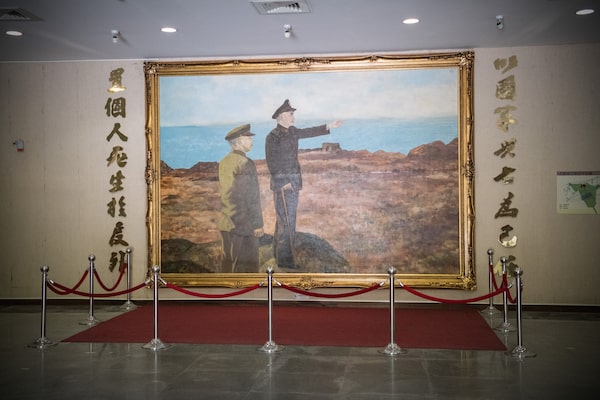
A painting of Kuomintang leader Chiang Kai-shek stands at a museum in Kinmen, a Taiwanese island close to the Chinese mainland.Carl Court/Getty Images
The traditional genesis of the Taiwan issue is the civil war that unofficially ended in 1949. But there’s also an earlier story, at the conclusion of a much earlier fight, a moment recorded with uncanny precision.
In the spring of 1895, China’s Viceroy Li Hongzhang, freshly shot in the face, was sitting before Japan’s Count Ito Hirobumi in the Port city of Shimonoskei, trying to delay the concessions his country had to make to end the war.
“Two months will give us more time,” Mr. Li said. “Why such headlong haste? The plum is already in your mouth.”
The response from Mr. Ito, a London-educated samurai, came brusquely: “But we shall hunger for it until we have bolted it down.”
When the two men were done, it was just past sunset. China’s government of the day, the Qing Dynasty, had signed away not just 300 million taels of silver but something far more precious, an asset that Beijing would not regain until 1945, when Japan lost the Second World War. Mr. Li ceded to Japan the island of Formosa, now known to the world as Taiwan.
Why this moment between Mr. Li and Mr. Ito is so important is the wider history it symbolizes. It’s an important milestone in what China has dubbed its Century of Humiliation. In its own way, it can be considered somewhat of a sordid founding myth of the modern country.
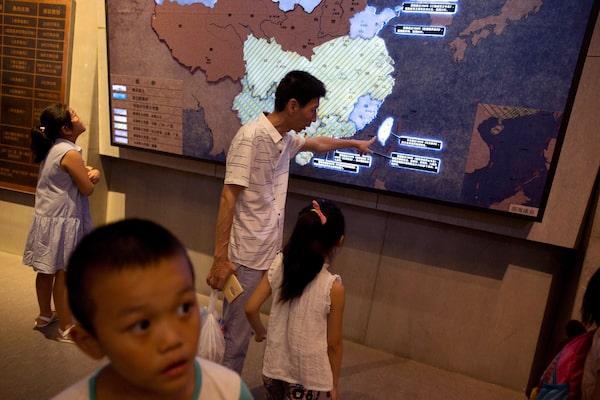
At a Beijing museum in 2017, a man points out Taiwan on the 'humiliation in the history of the Chinese nation' display, listing territories occupied or disputed since the 19th century.Ng Han Guan/The Associated Press
All countries have such stories, and some stories are closer to this than the others. For Russia, for example, it’s the famous “Moscow is silent” anecdote from President Vladimir Putin. A spy in East Germany, a younger Mr. Putin was greatly unnerved when the Berlin Wall fell, and a dying, diminished Soviet Union could do nothing as locals tried to storm the Stasi headquarters. Every move Russia has made on the world stage, such as trying to take back the former Soviet territory of Ukraine, stems from its defeat in the Cold War.
For China, it’s a different country with a different man of the day, whose personal origin story, tragically formative as it is, matters less to the country’s modern direction. But it’s not about Mr. Xi per se, just as how it’s not really about Mr. Putin either. For all his personal qualities, the very fact that a man with such geopolitical ambitions had risen to power in Russia shows the impact that Cold War defeat had on the country’s collective psyche. Mr. Putin and Mr. Xi are but conduits for the paths their countries are already on.
Underneath Russia’s and China’s moves on the world stage is the same story. A century ago, Beijing, too, was silent. China’s current view of the world can be traced back to the 19th century, when the storied empire became a quasi-colony to the world, humbled like the Soviet Union after the Cold War.
In March of 2021, the Chinese government spokeswoman Hua Chunying invoked this period directly. Amid tensions at the time, Ms. Hua said with a good dose of rhetoric, how the U.S. and Europe deal with Beijing brings to mind how they occupied China during the 19th century. The current West “resembles the Eight-Power Allied Forces in the late Qing Dynasty,” Ms. Hua said.
During that period, the loss of Taiwan to Japan had stood out as exceptionally painful. Every other time, the defeat of the backward, low-technology China was against a fancy, industrialized Western country. But Japan, having just started its own modernization, had once been a tributary state of China. There was no greater humiliation. To China’s Communist government, the fact that Taiwan is not under its control is a wound more than a century old. Beijing will never not claim Taiwan.
It’s anybody’s guess when matters will come to a head. It might not be this year or even this decade. But the world must recognize that it’s only a matter of time. This is a path on which events are already careering, set in motion long ago by a confluence of forces primal and unyielding.
The historian Lien Heng, grandfather of Lien Chan, the KMT presidential candidate whose defeat in 2000 marked his party’s decline, once wrote that there was little that was significant to this little island: “Taiwan’s sorrow is that it has no history.” Sadly, if the elder Mr. Lien had lived to this day, he might have realized that he had looked at the matter the wrong way. Taiwan’s sorrow is that it has too much history.
Asian geopolitics: More from The Globe and Mail
In the global struggle for industrial influence, China has one big advantage: Its grip on the supply of rare, critical minerals, including those mined in Canada. Mining reporter Niall McGee spoke with The Decibel about how a Manitoba cesium mine fits into China’s greater game. Subscribe for more episodes.
Frank Ching: Which way will China go on Taiwan?
Kristen Hopewell: Canada must show leadership in backing Taiwan’s Pacific trade bid
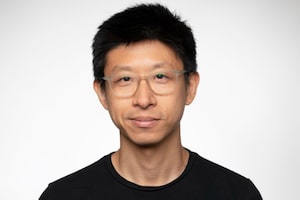 Ethan Lou
Ethan Lou